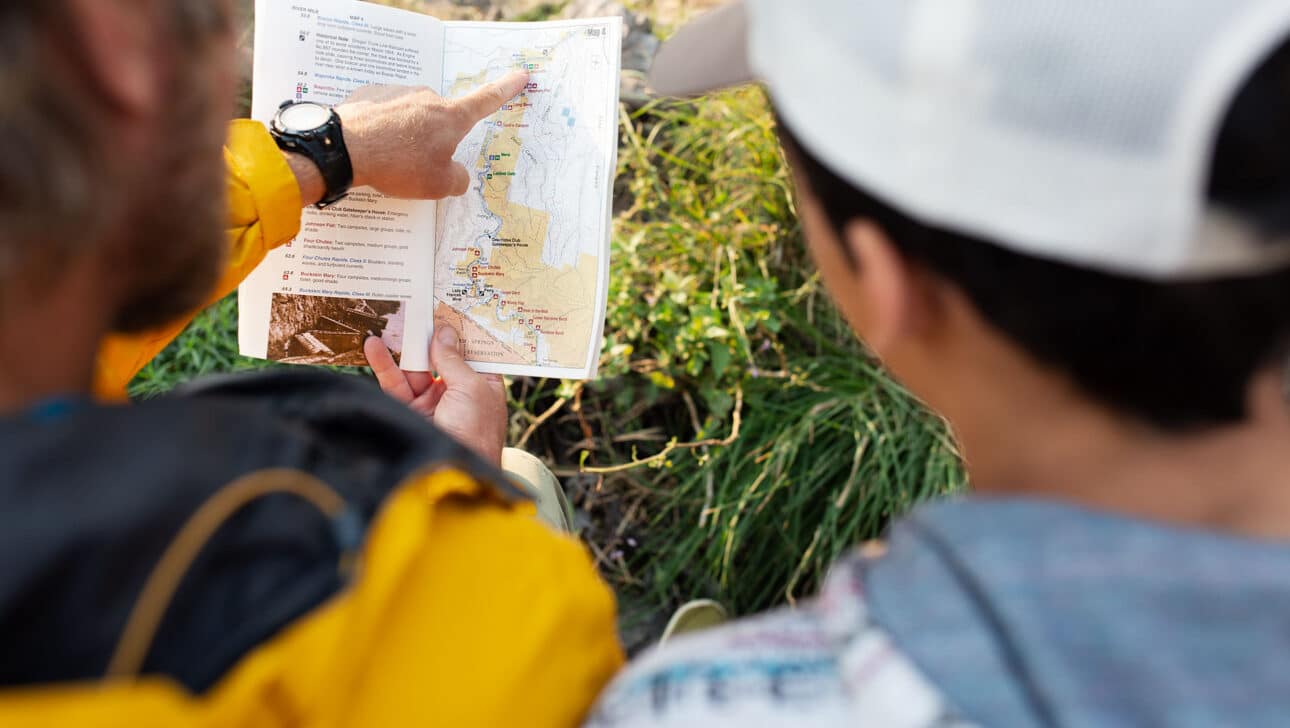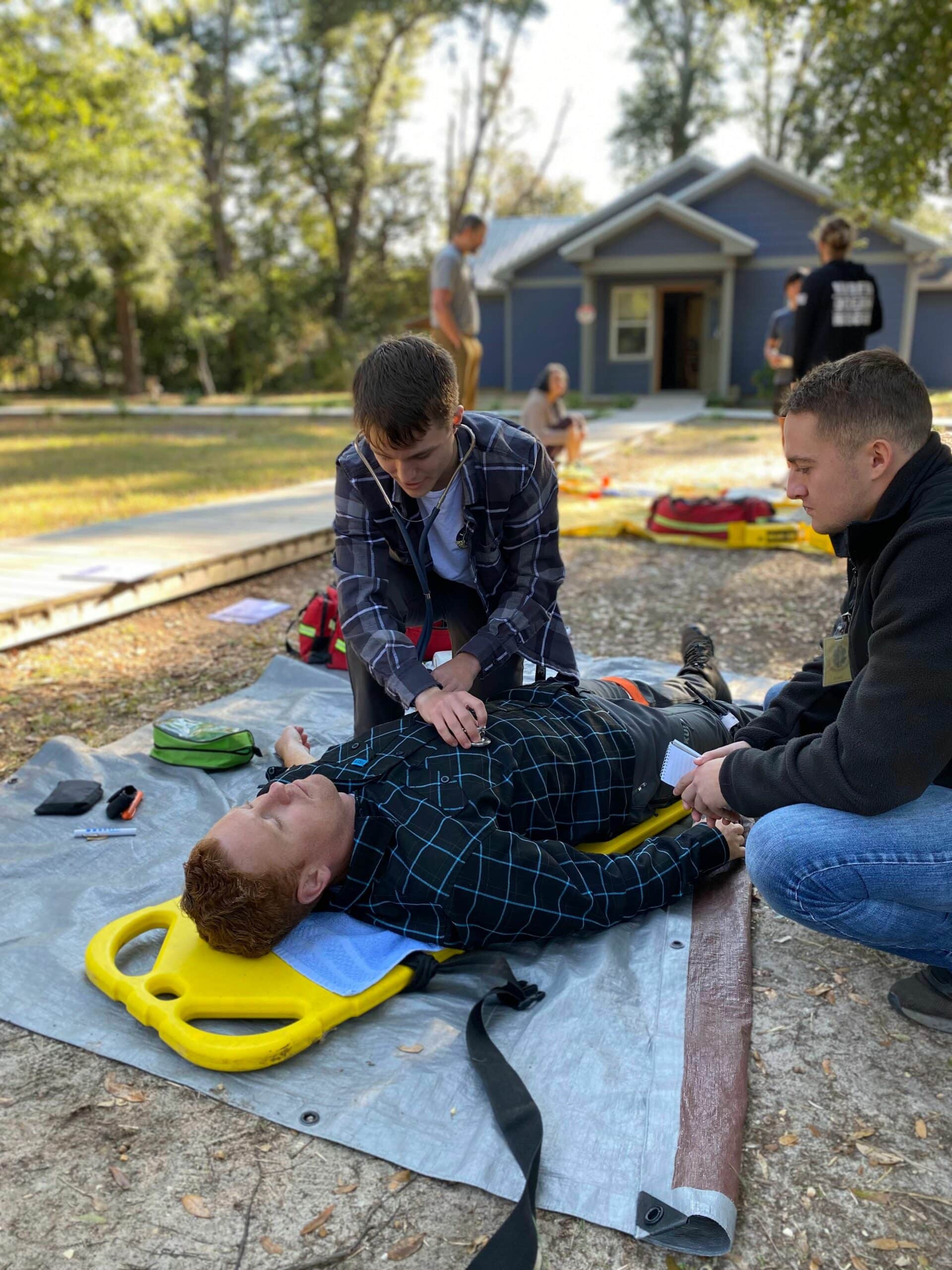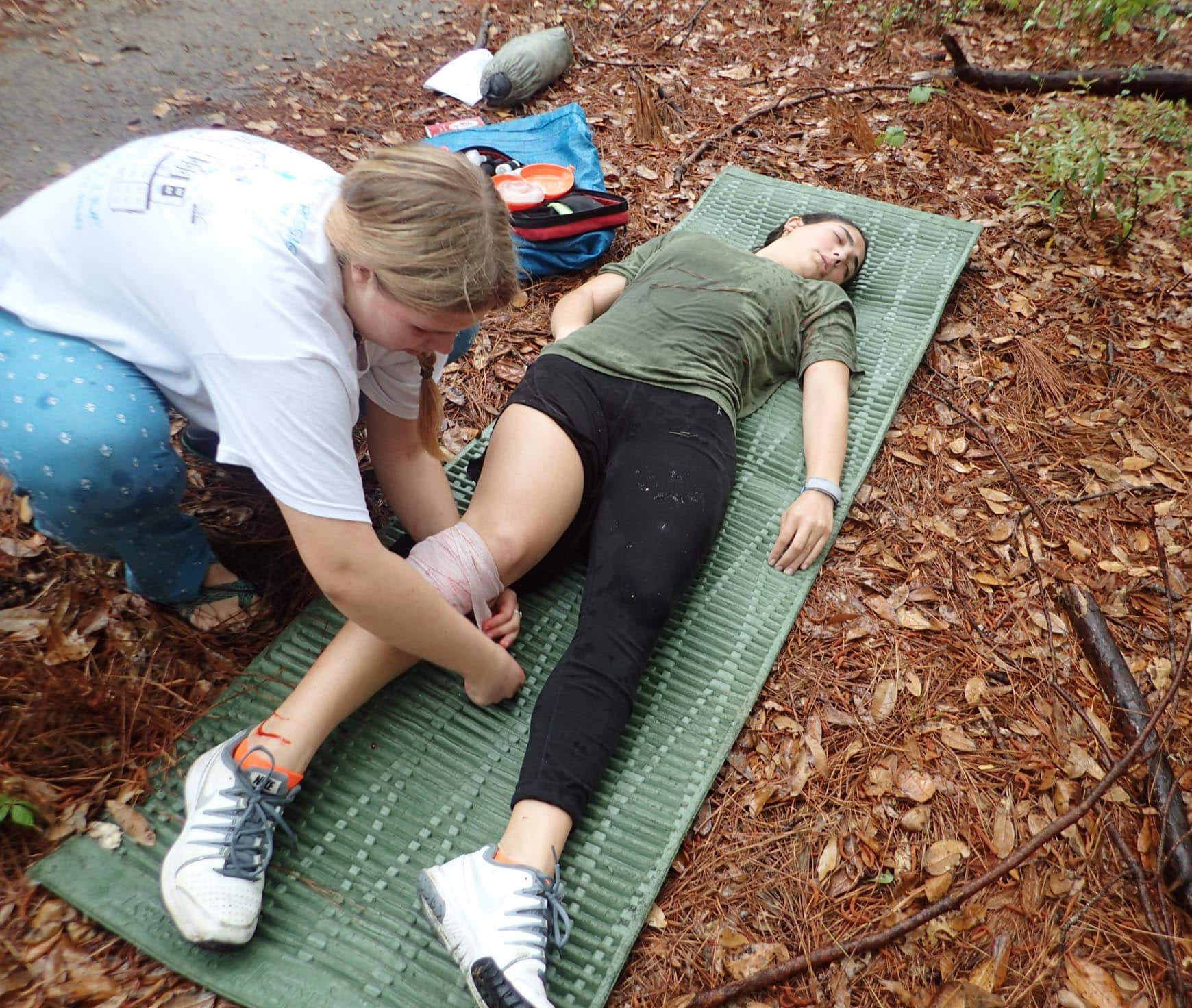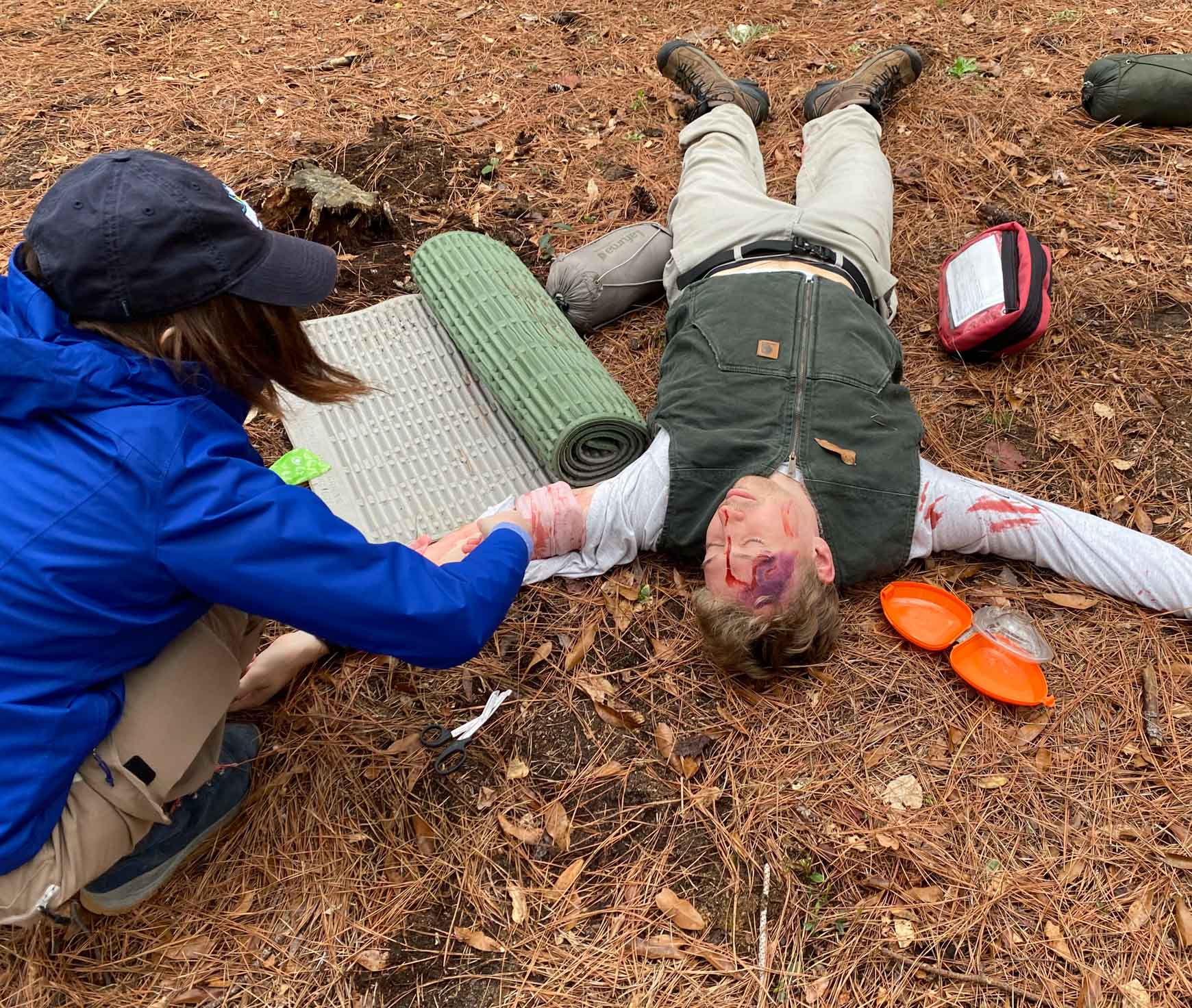Wilderness Medicine
Wilderness First Responder Recertification (Hybrid) – North Carolina
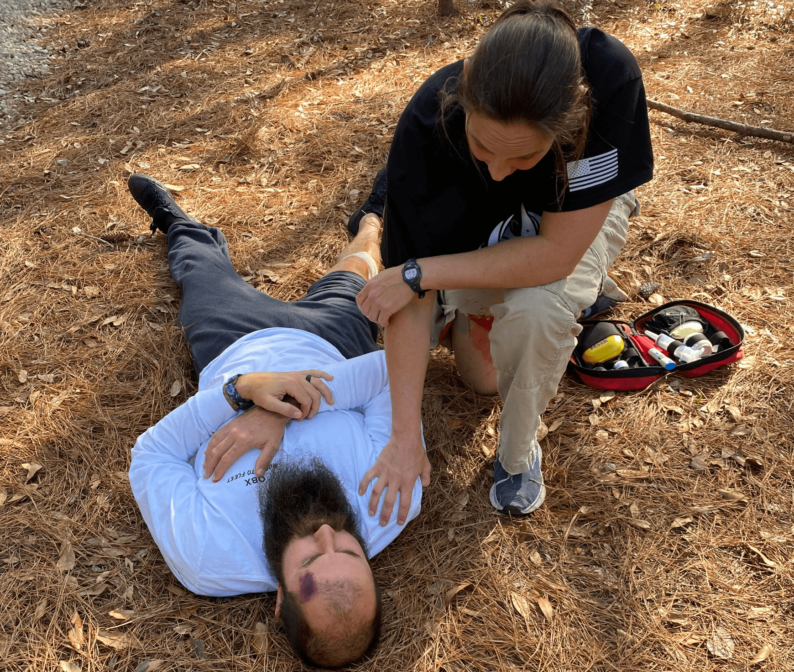
Adventure First
Here at The National Center for Outdoor & Adventure Education (NCOAE), our Hybrid Wilderness First Responder (WFR) Recertification course aims to refresh and recertify existing Wilderness First Responders (WFRs). We accomplish this by reviewing essential skills and wilderness protocols while discussing relevant updates in wilderness medicine, and testing for competencies that are required to recertify for the WFR designation.
This Hybrid WFR Recertification course includes an online self-study component that takes approximately 15+ hours to complete from home, followed by two days (or 16 hours) of in-person, hands-on instruction at the NCOAE campus or other hosted training site.
This recertification program is open to all Wilderness First Responders, regardless of the wilderness medical school or program from which you received your most recent WFR certification (unless that program was online only — more on this below). Students with a current W-EMT license can also recertify the wilderness portion of their W-EMT certification by taking and successfully completing this course.
Students who successfully complete the course receive a Wilderness First Responder (WFR) certification which is valid for three years, as well as an equivalent CPR certification that meets the American Heart Association’s Basic Life Support (BLS) CPR standards.
EDUCATION ALWAYS
- Wilderness First-Responder certification, valid for three years.
- Adult and Child Wilderness CPR and AED certification, valid for three years.
- This NCOAE-sponsored training exceeds the Wilderness First Responder & WEMT Scope of Practice requirements endorsed by the Wilderness Medical Society.
- Course topics include: Allergies and Anaphylaxis, Basic Life Support (including BLS/Healthcare Provider-level CPR), Circulatory System, Dislocations, Environmental Injuries, Lifts, Moves and Extrications, Musculoskeletal Injuries, Nervous System, Patient Assessment System, Respiratory System, Spine Management, Splinting, Wounds and Burns.
COURSE MATERIALS & EQUIPMENT
Once you enroll in the NCOAE Wilderness First Responder (WFR) Recertification course, you’ll receive:
ELIGIBILITY REQUIREMENTS
We invite graduates from other wilderness medical schools or programs who have a current WFR certification (unexpired or within the grace period allowed by your current certifier) to recertify with us.
Eligible graduates from other wilderness medical schools must have completed one of the following courses:
- WFR course with a minimum of 72 hours of in-person instruction
- 72-hour Hybrid course with a minimum of 45 hours of in-person instruction
- WFR Recertification course with a minimum of 16 hours of in-person instruction
Please note: If your original WFR certification or most recent recertification is from an online school or program — meaning your current certification didn’t include a practical / hands-on component — you may not participate in an NCOAE WFR recertification course.
Course Details
This training includes a foundation of wilderness medicine philosophy, with an emphasis on preventing and identifying medical emergencies, using appropriate technology, and understanding risk management.
The Hybrid WFR recertification combines 15+ hours of online independent study with a two-day (16 hours) hands-on practical training. Upon successful completion, students will receive a Wilderness First Responder certification and Adult and Child CPR and AED certification. Certifications are valid for three years.
To ensure there’s enough time to complete your self-paced coursework before your in-person session, you must register at least 30 days before your desired course date.
Your work during our Hybrid Wilderness First Responder Recertification Course may be eligible for college-level credits.
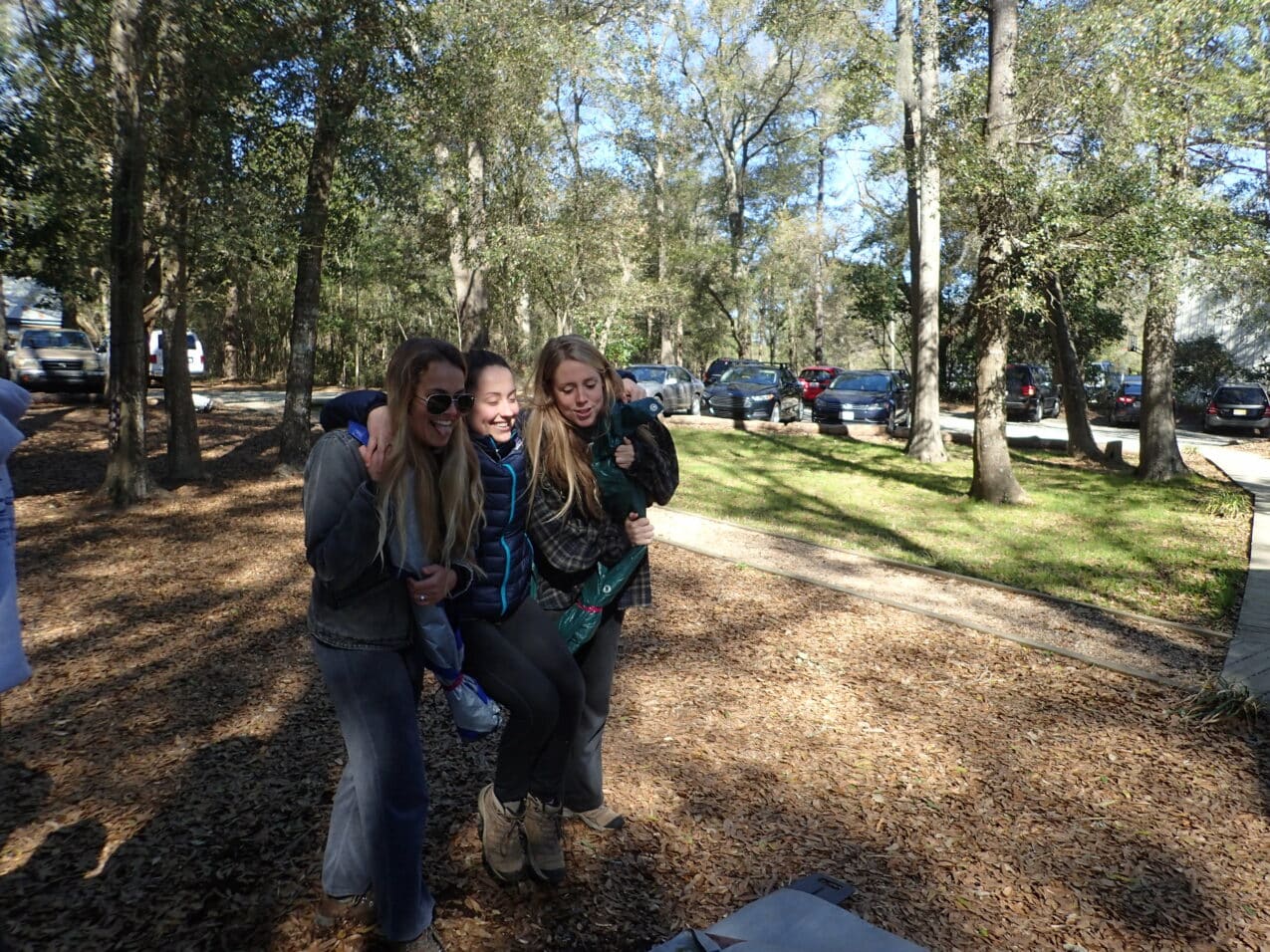
Highlights
- Complete and pass a 15+ hour self-study course beforehand, and complete the hands-on training at the NCOAE campus or other hosted training sites.
- Given the short duration of this course, NCOAE places an emphasis on scenarios and hands-on activities, to complement online learning material.
- Participants will be involved in patient assessment drills and simulations in the field.
On the Map
- NCOAE Wilmington, NC
Talk to Us
Have any further questions about the course location, what you'll learn, or what else to expect? Contact us, we're here to help!
DATES
FAQS
Frequently Asked Questions
How is the Hybrid Wilderness First Responder (WFR) Recertification different from other WFR Recertification courses?
This recertification course is open to all Wilderness First Responders (WFR) and Wilderness EMT (W-EMT) looking to recertify their WFR certification. The hybrid training is unique in that it includes an asynchronous online study portion (approximately 15 hours) to be completed from home, followed by two days of in-person skills training.
What exactly makes your Wilderness First Responder (WFR) training ‘Hybrid’?
Our Hybrid Wilderness First Responder (WFR) training requires you to spend around 15 hours with at-home study and testing prior to attending the two-day practical skills training. Approximately 60 days prior to your practical skills training dates, we will send you an email containing access to the online asynchronous portion of the course. You need to make sure you give yourself enough time to thoroughly read the information on our e-learning website in order to properly prepare for testing.
As a certified Wilderness First Responder (from your organization), how do I replace a missing WFR certification card?
You can contact us at studentservices@ncoae.org and write “lost card” in the subject line to purchase a new card. When seeking to buy a new card, please include your full name, mailing address, date and location of your course, and the name of your WFR Recertification instructor. Or if you prefer, you can call us at (910) 399-8090.
What do certified Wilderness First Responder (WFR) Recertification graduates receive after completing the course?
Grads receive a WFR certification card, WCPR certification card, and a sticker. Graduates or potential employers can call or email us at any time to verify your certification. For those who contact us online, we will happily send them proof of certification by return email. Proof of Certification requests should be sent to studentservices@ncoae.org with “WFR Proof of Certification Request” in the subject line.
How many years is my Wilderness First Responder certification in effect? And how do I get recertified?
Your Wilderness First Responder certification expires three (3) years from the date the certification was issued, but Wilderness EMT and WFR graduates can become recertified by taking our WFR Recertification course. Students who let their certification lapse must take the full WFR course again. But even with current certification, we strongly suggest you take the full course every six (6) years as a refresher.
Can I get an extension on my Wilderness First Responder certification?
There are no exceptions here — Wilderness First Responder certifications cannot be extended beyond the expiration date listed on your WFR certification card. And being late by one day past that expiration date makes for a sad story, but there is no grace period. It’s advisable to recertify before the expiration date, which requires only a minimum of planning on your part. That’s why we send out an e-mail reminder to graduates about four months prior to their expiration date. To assure you receive your email reminder to renew your Wilderness First Responder, please make sure your current e-mail address is on file with our office.
What if I received my certification elsewhere? Can I recertify with you?
When you sign up with us, make sure to indicate where you obtained your WFR certification and that your current certification hasn’t expired. We’ll need you to provide your card with its expiration date. And, as mentioned above, if your card has expired, you must take the entire course again until you successfully pass our recertification course.
Eligible graduates from other wilderness medical schools must have completed one of the following courses:
- WFR course with a minimum of 72 hours of in-person instruction
72-hour Hybrid course with a minimum of 45 hours of in-person instruction
WFR Recertification course with a minimum of 16 hours of in-person instruction - Please note: If your original WFR certification or most recent recertification is from an online school or program — meaning your current certification didn’t include a practical / hands-on component — you may not participate in an NCOAE WFR recertification course.
Will I receive CPR training and certification along with my Wilderness First Responder certification?
You will receive a three-year certification in Wilderness CPR (WCPR). Our WCPR training follows the guidelines of the American Heart Association (AHA).
